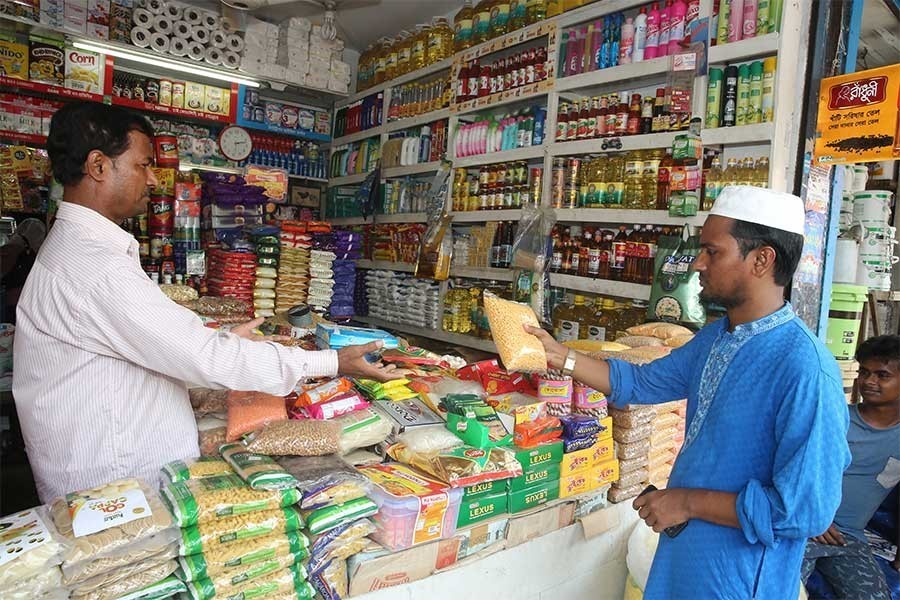
Published :
Updated :

The findings of a recent SANEM (South Asian Network on Economic Modelling) survey, a representative one, have brought to the fore a few ground realities that deserve the attention of the country's policymakers.
As expected, most firms belonging to large, medium, small and micro categories experienced fluctuations in their recovery process, depending on the rate of infection and fatality of the Covid-19.
When businesses were making efforts to come out of the woods during the third quarter of the immediate past financial year (FY), the second wave struck with full venom.
The Kent variant of the pathogen---SARS-CoV-2, was replaced by a far more contagious and deadly Delta variant, originating from India. People in their thousands, both in rural and urban areas, got the virus. The Covid-dedicated health facilities could not cope with the onrush of patients experiencing breathing problems. Many even died in the ambulances as hospitals refused to admit them for the non-availability of beds in the intensive care units (ICUs) or short supply of life-saving oxygen.
As the situation turned grave with more than 250 Covid patients dying and the positivity rate hovering between 15,000 and 18,000 daily, the authorities imposed 'hard restrictions' on people's movement and economic activities.
The restrictions, popularly known as 'lockdown', proved to be yet another blow to businesses that were in the midst of the recovery process. In percentage terms, according to the SANEM study, the recovery came down to 35 per cent during the April-June period of FY'21 from 57 per cent between January and March of the same fiscal.
The small and micro enterprises, according to the survey, have suffered the most since the pandemic struck the country as elsewhere in the world.
Yet these enterprises tried to overcome odds like the large and medium ones. But their struggle proved to be hard. A good number of them had to wind up, failing to cope with difficulties.
Most of the small and micro enterprises used their savings to survive and, once that was exhausted, they resorted to borrowing from friends and relatives. Some of them, says the SANEM study, retrenched their employees as a means to cut operating costs.
The issue of much-touted stimulus packages comes here. The packages were announced in the early part of the last FY. But the response coming from the 501 big, medium, small and micro enterprises covered by the SANEM survey is found to be very disheartening. Around 79 per cent of the firms surveyed said they had received no stimulus loans and some of them even were not aware of such funding.
Only a few large units have received funds under the packages so far.
The central bank has repeatedly advised the banks to expedite the disbursement of stimulus packages. But the latter, it seems, has been following a conservative approach as far as the selection of borrowers is concerned.
It might stir up anger in many to hear that a section of lenders allegedly sought bribes when distressed business entities, particularly micro and small ones, sought funding under the stimulus packages. This would remind everyone of the saying that some people, even under the hardest conditions, cannot come out of their old habits.
The second wave of the pandemic, it seems, waning. But that will not be the end of it. There could be a third wave and maybe many more. The waves could be less deadly and short-lived or otherwise. Even health experts and virologists are not in a position to predict the behaviour of the virus.
So, the peoples across the world will have to live with the virus and learn to continue with their economic activities. Dr Selim Raihan, SANEM executive director, has rightly said the people have learnt many things during the last one and a half years about the way of fighting the virus and survive, both physically and economically.
"We must design our protocols from the lessons learnt", he asserted.
As most restrictions are gone in the backdrop of an improvement in the Covid situation, businesses have been opening up and, as noted in the SANEM study, their confidence is ticking up.
It is no denying that the jolt the economic activities have suffered in the wake of the pandemic is severe. Businesses are likely to take a long time to recover, even with adequately designed protocols. They will encounter even far more serious, distressing situations if the government failed to put such protocols in place without any further delay.
One cannot be sure whether the government will start designing befitting protocols or continue to rely on stimulus packages that have failed to deliver results up to the desired level. Still, there is time for the central bank and the finance ministry to find reasons behind the poor disbursement of funds under the stimulus packages, particularly to small and micro-enterprises. It could be that banks are less enthusiastic to lend money to these entrepreneurs because of the high default rate. Yet there must be ways to deal with that problem.
Beyond the officially recognised types of enterprises, there are millions of tiny shops and establishments across the country. Everybody sees them, but they do not exist in the official records. A substantial number of them have failed to cope with the pandemic onslaught and gone out of business. We can only mourn their untimely demise, if no rescue plan is devised.


 For all latest news, follow The Financial Express Google News channel.
For all latest news, follow The Financial Express Google News channel.